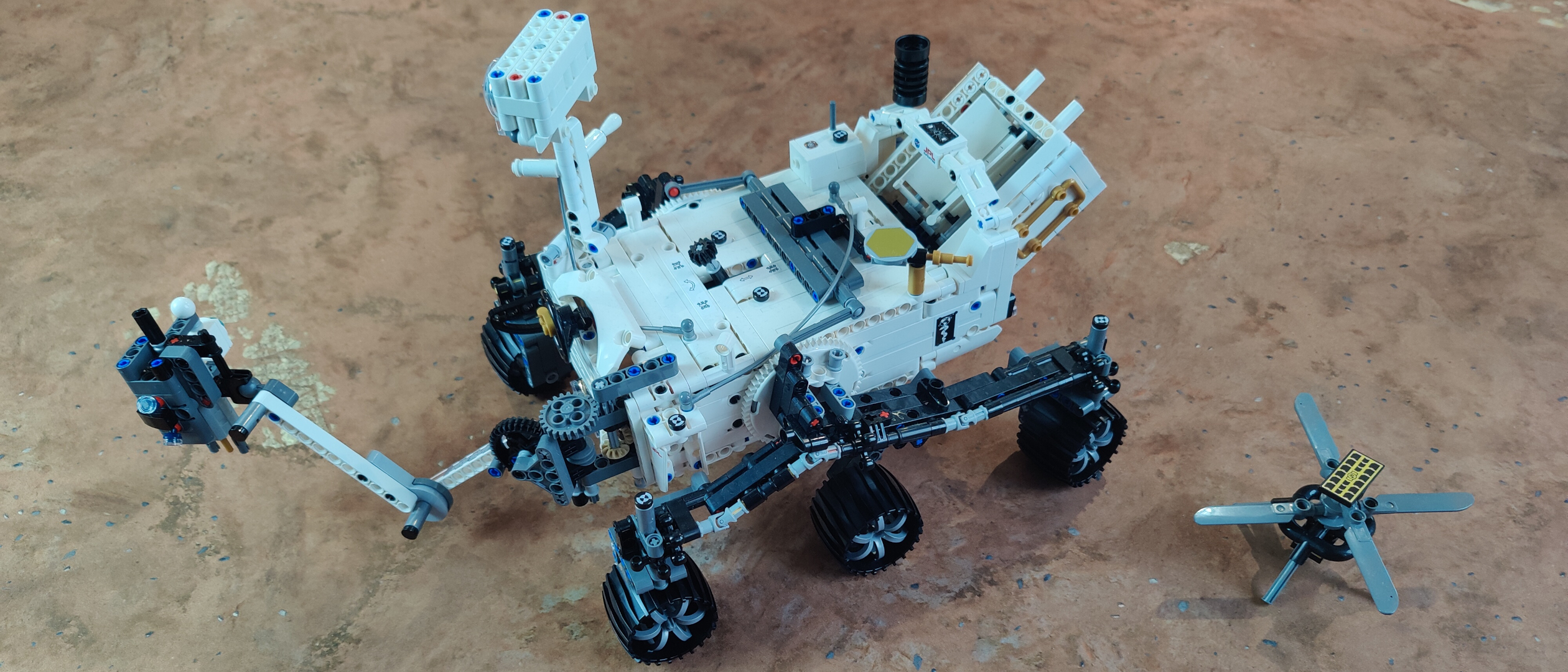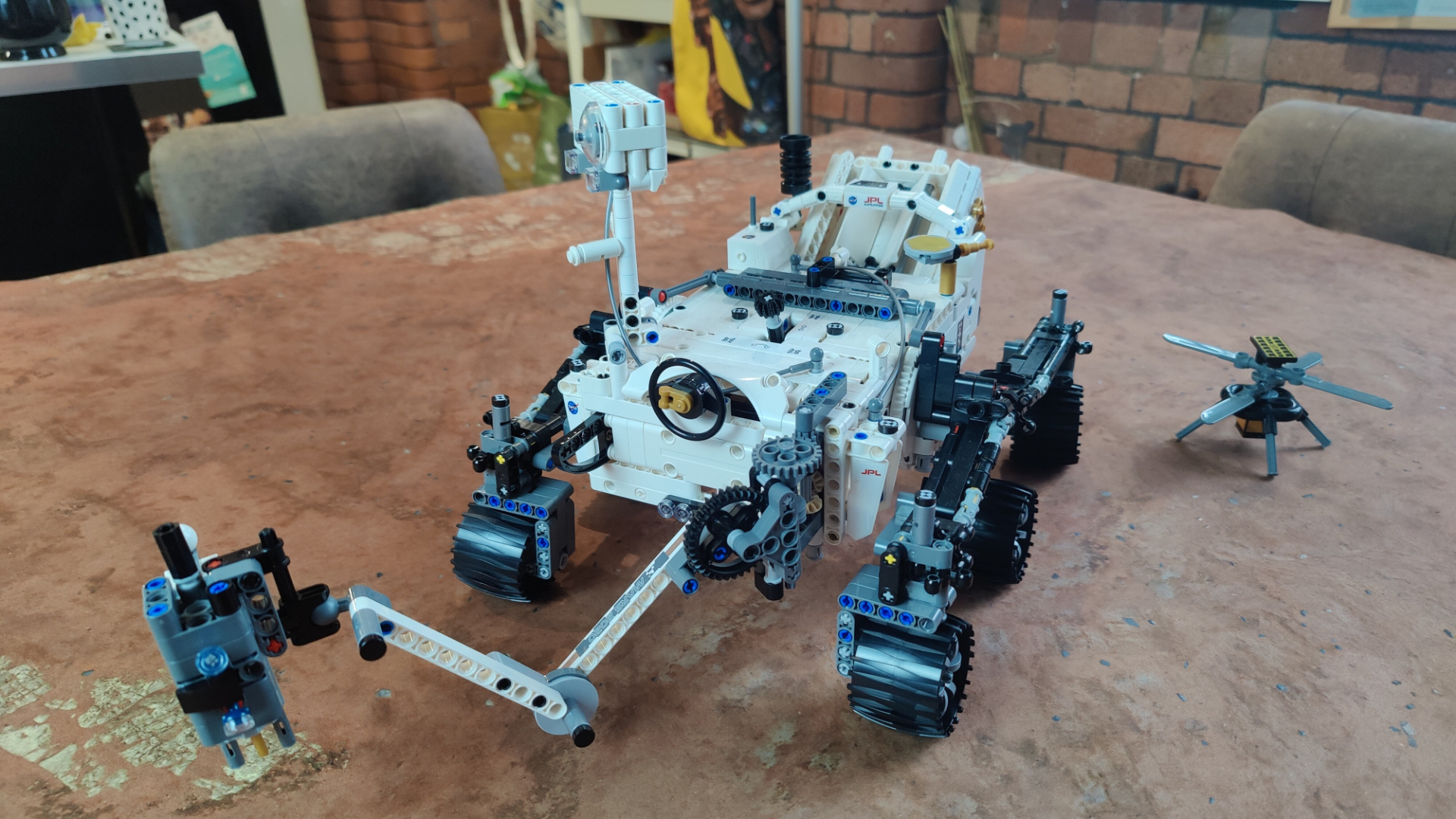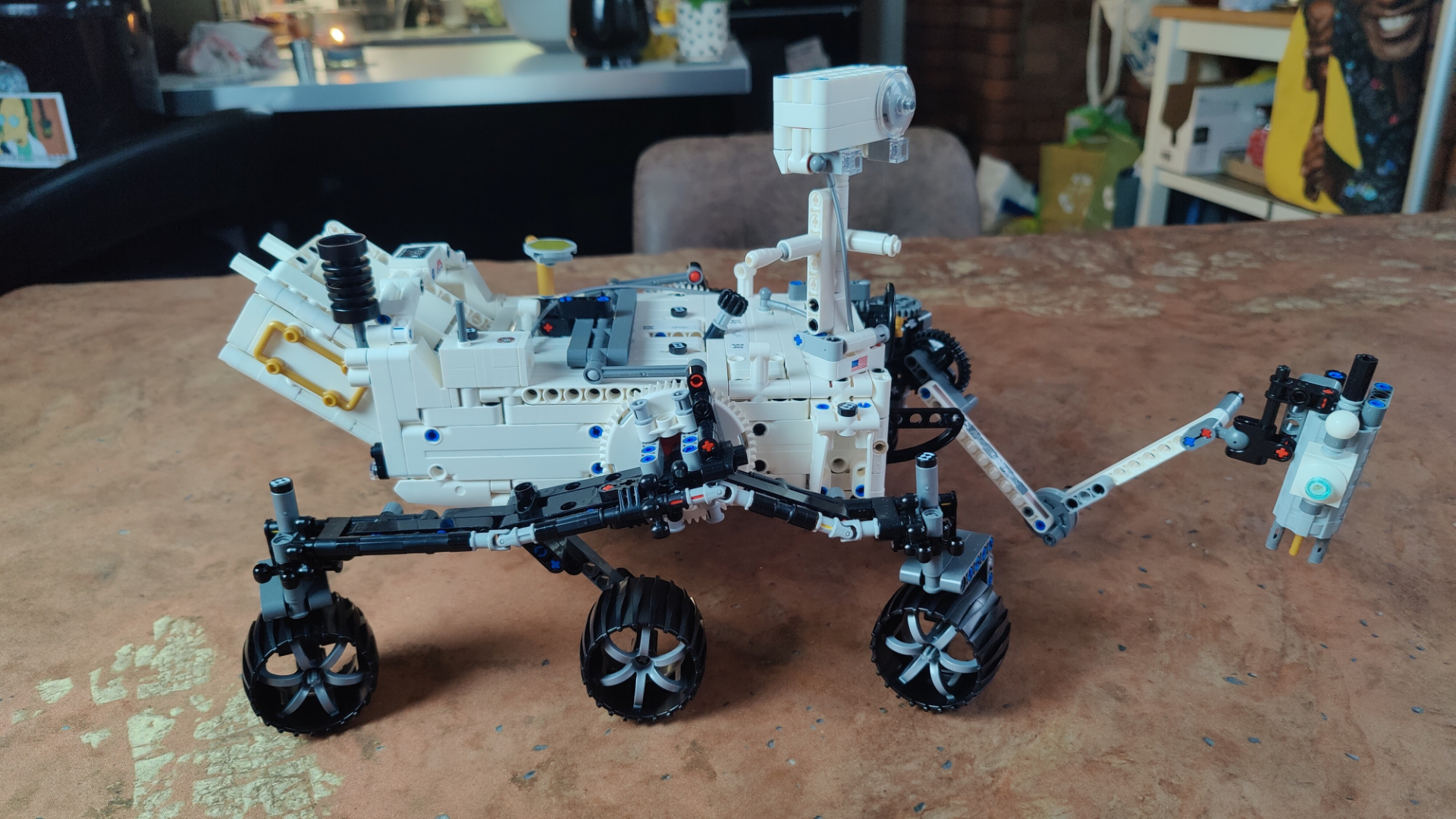Space Verdict
The Lego Perseverance Rover is a wonderful piece of Lego engineering that should please Lego space fans of all ages. It’s a gorgeous display piece for adults, and offers a lot of playability for kids too.
Pros
- +
Looks fantastic
- +
Lots of moving parts
- +
Amazing attention to detail
Cons
- -
Technic Lego isn’t for everyone
- -
A lot of stickers
Why you can trust Space.com
Price: $99.99/£84.99
Model number: 42158
Number of pieces: 1,132
Dimensions: 9 in x 12.5 in x 9 in (23 cm x 32 cm x 23)
Recommended age: 10+
If you’re in the market for a Martian rover and don’t want to spend the requisite $2.7 billion to get NASA to build you one, then the Lego Perseverance Rover is here to answer your prayers.
At $99.99/£84.99, the Lego Perseverance Rover is on the cheaper side for the best Lego Space sets, especially if you’re looking at the authentic NASA kits. NASA’s Perseverance Rover might not be quite as well known as its predecessor, the Curiosity Rover, but it’s an important piece of scientific history that any space nerd should be thrilled to see immortalized in Lego form.
Perseverance was the centerpiece of NASA’s Mars 2020 mission, successfully touching down on the Martian surface on Feb. 18, 2021. Since then, it has been roaming around the red planet doing vital and ground-breaking scientific research. That sounds like hard work though, so I’m just gonna chill, build this Lego set, and tell you all about it.
Lego Perseverance Rover: Build
Unlike most of the space-themed Lego sets that we’ve looked at, the Lego Perseverance Rover is a Technic set. Technic Lego sets are more like engineering projects, complete with advanced construction techniques and moving parts that operate via gears, levers, and joints.
In practice, this means that building a Lego Technic set takes more of a toll on your fingers and thumbs than the average set, as you’ll be pushing pins into holes and snapping items together a lot more. It’s worth persevering with though (sorry, I couldn’t resist) because the end result is a more dynamic and technically impressive model.
After a brief appetizer of building the Ingenuity helicopter, you get started by building up the main body of the Perseverance Rover across the first two bags. From there, you add the wheels and their supporting architecture in bag three, before finally adding the moving arm along with various scientific gizmos and doodads in bag four. It’s a fun build that never gets repetitive or too complicated, which makes sense given the 10+ age rating.
The Lego Perseverance Rover took me about four hours to put together in total (and I was going at it pretty intensely, so it’ll likely take longer). This is a good amount of build time for a set in this price range — you’re certainly getting value for money if you enjoy the build experience.
Breaking space news, the latest updates on rocket launches, skywatching events and more!
There are a good number of stickers included in the set. While this is normally an instant point for me to complain about, in truth, they were all for details that are very unique to the Perseverance Rover, so I can see why Lego chose not to print custom pieces for them. They were all easy enough to line up, but sometimes the instructions don’t mention the sticker until after you’ve assembled a section, making them much more difficult to stick on.
Lego Perseverance Rover: Design
All that hard work is worth the effort, because the Lego Perseverance Rover is a thing of beauty when it’s finished. The Technic look isn’t for everyone, but it absolutely suits a piece of mechanical engineering perfection like the Perseverance Rover.
All of the various scientific instruments that the Perseverance is equipped with are represented on the model, with the ultraviolet and x-ray spectrometers present on the end of the movable arm, along with the main camera arrays mounted on the top of the vehicle. At Lego scale, some of these components only bear a passing resemblance to their real-life counterparts, yet the effort to add them all is very much appreciated.
All those connecting gears, levers, and pulleys you just assembled come good when you actually start to explore the model. It has fully operational 360° steering controlled via a lever on the top of the rover. On top of that, it has fully articulated suspension which is great for playability as this means the vehicle can drive over uneven terrain. The main arm is moveable on two different axes thanks to the dual-gear controls at the back of the rover too — it’s quite slow to move, but it’s very satisfying to play about with. While this is a Technic kit that might primarily appeal to older space nerds like myself, it is recommended for ages 10+, so it’s great to see so many play features built into it.
As a nice little bonus, you also get a little replica of NASA’s Ingenuity helicopter to build alongside the main rover — this little machine was sent alongside Perseverance on its mission to Mars to help NASA test how powered flight would perform on Mars. The model is quite simple and includes spinning rotors.
Along with the model itself, there is also a Lego Technic AR app that lets you explore and learn more about the Perseverance Rover. Most of it is just pointing at bits of the rover and explaining what they do, though there is a neat function where you can fly a virtual version of the Ingenuity helicopter. It’s a cool feature that provides some great educational value for youngsters, but sadly it doesn’t really interact with the actual Lego model itself.
Should you buy the Lego Perseverance Rover?
The Lego Perseverance Rover is a wonderful addition to the Lego NASA line-up, bringing new building techniques and a level of playability that we don’t typically see with these kinds of sets. This makes it ideal for younger space enthusiasts with a passion for science and technology as they can learn about the real Perseverance rover mission, while expanding their engineering knowledge and interest when assembling it.
At the same time, it’s a gorgeous showpiece that any adult Lego space fan would be thrilled to have on display. Building Technic Lego is a bit of a different experience that not everyone will enjoy, and no one likes stickers on Lego sets, but neither of these points should hold you back from roving down to the store to pick this one up.
Other Lego Space sets to consider
Want more space and NASA-themed sets? Then the Lego NASA Space Shuttle Discovery really is out of this world. It’s a little more pricey than the rover set, coming in at $199.99/£169.99, but you get your money's worth with over twice as many pieces. The shuttle has an openable cargo hold and comes with a model of the Hubble Space Telescope too. Check out our Lego NASA Space Shuttle Discovery review to see our full thoughts (spoiler: we loved it!).
If you’re exploring deep space for other Technic sets, then the new VTOL Heavy Cargo Spaceship LT81 set is coming in for a landing and it looks awesome. While it's not a remake of an existing NASA craft, it is a sci-fi design with real-world inspirations and tons of playability — the rotating engines, working grabbing claw, and loadable cargo are especially cool. At $109.99/£89.99, it’s only slightly more expensive than the rover set.

Ian is the Entertainment Editor at Space.com, covering movies, TV series, and games in the space and sci-fi realms. He's a massive sci-fi nerd and has been writing about games and entertainment for over eight years, with articles on sites like Space, LiveScience, GamesRadar, and more. With a degree in biology, a PhD in chemistry, and his previous role at the Institute of Physics Publishing, Ian is taking a world tour through the different scientific disciplines.



